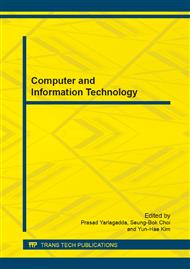[1]
Simon Perathoner, Kai Lampka, Nikolay Stoimenov and Lothar Thiele: Combining Optimistic and Pessimistic DVS Scheduling: And Adaptive Scheme and Analysis. ICCAD, pages 131-138 (2010).
DOI: 10.1109/iccad.2010.5654109
Google Scholar
[2]
N. Bansal, T. Kimbrel, and K. Pruhs. Dynamic speed scaling to manage energy and temperature. Proceedings of the Symposium on Foundationgs of Computer Science, pages 520-529, (2004).
DOI: 10.1109/focs.2004.24
Google Scholar
[3]
N. Bansal and K. Pruhs. Speed scaling to manage temperature. STACS, pages 460-471, (2005).
DOI: 10.1007/978-3-540-31856-9_38
Google Scholar
[4]
Kai Huang, Luca Santinelli, Jian-Jia Chen, Lothar Thiele, Giorgio C. Buttazzo. Adaptive dynamic power management for hard real-time systems. Real-Time Systems Symposium, (2009).
DOI: 10.1109/rtss.2009.25
Google Scholar
[5]
J. Bengtsson and W. Yi. Timed automata: Semantics, algorithms and tools. Lectures on Concurrency and Petri Nets, pages 87-124, (2004).
DOI: 10.1007/978-3-540-27755-2_3
Google Scholar
[6]
J. -J. Chen, N. Stoimenov, and L. Thiele. Feasibility analysis of on-line DVS algorithms for scheduling arbitrary event streams. IEEE Real-Time Systems Symposium, pages 261-270, (2009).
DOI: 10.1109/rtss.2009.21
Google Scholar
[7]
V. Devadas and H. Aydin. On the interplay of dynamic voltage scaling and dynamic power namegement in real-time embedded applications. EMSOFT, pages 99-108, (2008).
DOI: 10.1145/1450058.1450073
Google Scholar
[8]
M. Hendriks and M. Verhoef. Timed automata based analysis of embedded system architectures. IPDPS, (2006).
Google Scholar
[9]
R. Jejurikar, C. Pereira, and R. Gupta. Leakage aware dynamic voltage scaling for real-time embedded systems. Proceedings of the Design Automation Conference, pages 275-280, (2004).
DOI: 10.1145/996566.996650
Google Scholar
[10]
J. Le Boudec and P. Thiran. Network Calculus: A Theory of Deterministic Queuing Systems for the Internet. Springer, (2001).
Google Scholar
[11]
L. Thiele, S. Chakraborty, and M. Naedele. Real-time calculus for scheduling hard real-timesystems. ISCAS 4: 101-104, (2000).
Google Scholar


